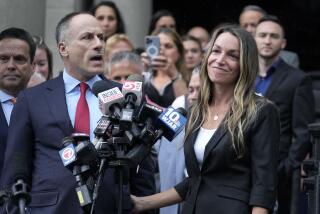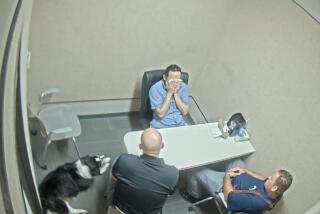Peyer-Case Damage Claim Goes to Jury
- Share via
The final chapter in the 1986 murder of Cara Knott neared an end Monday, when a Superior Court jury began deliberating a suit for damages against the California Highway Patrol and former officer Craig Peyer, who was convicted of killing Knott.
Knott, 20, was strangled Dec. 27, 1986, below the Mercy Road off-ramp from Interstate 15. Peyer, a CHP officer for 13 years, was convicted of first-degree murder on June 22, 1988. He is serving 25 years to life in state prison.
Peyer and the CHP were sued for unspecified damages by Knott’s family. The civil lawsuit alleged negligence by the CHP in hiring Peyer and failing to adequately supervise him. Peyer, 40, also was sued for wrongful death.
The jury must determine the percentage of culpability for Peyer and the CHP and the amount of the damages.
In his closing statement Monday, attorney Brian Monaghan, who is representing the Knotts, asked jurors to find the CHP and state of California responsible for most of the damages, whatever they might be.
Monaghan said Peyer played “a sex-power fantasy” in the months leading up to Knott’s murder by stopping numerous young women after dark at the isolated Mercy Road off-ramp. Some women testified at Peyer’s criminal trial that he had detained them for up to two hours while he engaged them in personal conversations.
Peyer’s attorney, Orange County lawyer Brad Miller, told the jury that Peyer is a “non-issue.” Miller cautioned jurors not to be swayed by the Knott family’s grief and sorrow and award the family a huge sum.
“Don’t let your verdict become well-known because of its extravagance,” Miller said.
Not surprisingly, Deputy Dist. Atty. Randall B. Christison, who is representing the CHP, argued that Peyer is responsible for “99% of the damages.”
The monthlong trial focused on whether CHP officials were aware that Peyer had a habit of stopping young women at the off-ramp and if the practice was sanctioned by his supervisors.
Another key issue raised at the trial was whether CHP officials were negligent by not responding adequately to complaints against Peyer because of the nighttime stops.
“This case is about supervision; what the CHP knew or should have known. . . . It’s about responsibility,” Monaghan said.
During the trial, CHP officials testified that patrol officers frequently directed motorists to stop at a ramp rather than on the freeway shoulder because it is safer. They said drunk drivers are often drawn to the taillights of a stopped patrol car, like a “moth effect.”
“Are moths attracted only to female taillights?” asked Monaghan, who argued that Peyer stopped more women than men after dark. He added that officers were required by CHP policy to stop motorists in lighted areas.
Christison contested that assertion. The CHP manual considered it “a good practice” to make traffic stops in lighted areas but “it’s not a policy,” he said.
In a strong condemnation of the CHP, Monaghan charged that officials destroyed key documents and altered another that proved Peyer was not adequately supervised.
“The evidence offered by the state of California should be viewed with distrust,” Monaghan told the jury.
Pointing to a CHP memo shown on a screen, Monaghan pointed to what he said was a doctoring of the document.
“It doesn’t take a rocket scientist to tell that’s a phony,” Monaghan said. “The CHP doctored a piece of evidence for this court. This is like the Keystone Kops. That’s an amateurish job of phonying documents. They can’t even lie to you right.”
Monaghan said the memo pertained to a complaint about Peyer received the month before Knott was killed. He charged that somebody used a different typewriter to type “citizen inquiry,” instead of complaint, after Peyer was arrested for Knott’s death.
In his closing statement, Christison defended the memo and denied that it had been altered. The citizen inquiries are “statements of dissatisfaction,” Christison said. He acknowledged that some key documents are missing, but denied they were deliberately destroyed.
Calling allegations of shredding of documents by the CHP “a distasteful part of this trial,” Christison suggested that documents are routinely destroyed after they are filed for a period of time.
Christison attempted to poke holes in the testimony of several women who said Peyer stopped them for long periods at the Mercy Road off-ramp. He called allegations about the lengthy stops “exaggerations.”
Picking up a thick copy of traffic tickets issued by Peyer, Christison asked jurors to study them because the citations would show that some women lied about the long stops.
Georgia Fontana, for example, said she was stopped for two hours by Peyer. But Christison said Peyer’s ticket book showed that he cited another motorist on another stretch of I-15 about 20 minutes after he stopped Fontana.
Patrice Diaz said she was detained by Peyer for 45 minutes. However, Christison said, Peyer stopped another motorist on I-15 about 15 minutes after citing Diaz.
Christison said two women who claimed to have been stopped by Peyer were in fact stopped by other officers. One woman testified she was stopped during a shift that Peyer was not working, and another woman was stopped on a day when Peyer was absent because of illness, Christison said. He did not identify those women.
Throughout the trial, Monaghan hammered away at CHP officials for not supervising Peyer and for failing to respond to what he said was Peyer’s pattern of stopping young women. CHP officials, including Peyer’s supervisors, are equally responsible for not intervening in time to prevent Knott’s death, Monaghan said.
“Did the (CHP) sergeants help him kill her,” an angry Christison said Monday. “ . . . The basic issue is whether there was any sergeant with information available to him before the murder. . . . There was nothing to indicate (Peyer) was a dangerous person before the incident.”
He called Peyer’s murder conviction “one of the darkest days in the history of the CHP.”
More to Read
Sign up for Essential California
The most important California stories and recommendations in your inbox every morning.
You may occasionally receive promotional content from the Los Angeles Times.













